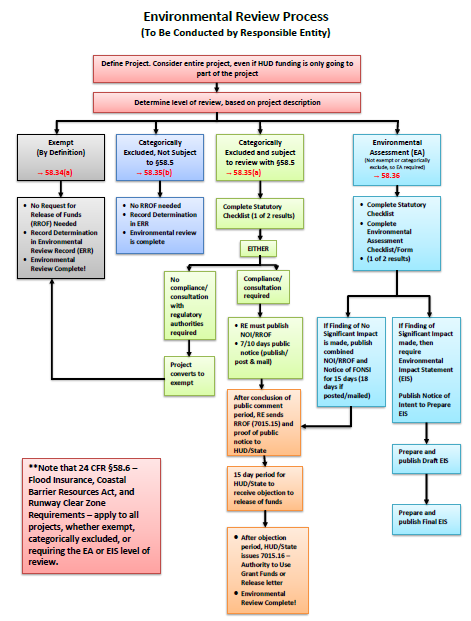Grant Administration: Section 5.1 Responsibilities
Grantee Responsibilities- Develop Environmental Review Record (ERR)
- Determine project scope
- Determine if project is exempt, categorically excluded or whether an environmental assessment/impact statement is needed
- Publish findings in newspaper
- Hold public comment period
- Request release of funds (RROF)
State’s Responsibilities
- Receive RROF
- Review for compliance with 24 CFR Part 58
- Hold for public comment period
- Release funds as required
- Monitor ERR
Applicable Regulations
The HUD rules and regulations that govern the environmental review process can be found at 24 CFR Part 58. The provisions of the National Environmental Policy Act (NEPA) and the Council on Environmental Quality (CEQ) regulations in 40 CFR Parts 1500 through 1508, and a myriad of other federal laws and regulations (some of which are enforced by state agencies) also may apply depending upon the type of project and the level of review required. These laws and authorities are referenced in the HUD and NEPA regulations and are cited in several of the chapter links to those requirements. 40 CFR 1500-1508 and 24 CFR Part 58
The Responsible Entity
Under 24 CFR Part 58, the term “responsible entity” (RE) means the grantee under the state CDBG Program. Therefore, these terms are used interchangeably with grantee throughout this chapter and the attachments. The responsible entity must complete the environmental review process. Environmental review responsibilities have both legal and financial ramifications. As part of the assurances and agreements signed by the responsible entity, the Authorized Official (AO) of the responsible entity agrees to assume the role of “responsible federal official” under the provisions of NEPA. This means that if someone brings suit against the responsible entity in federal court on environmental grounds, the AO will be named as the defendant. There may be financial implications associated with any lawsuit and, of course, any fines, judgments or settlements that may result.
NOTE: CDFA accepts no responsibility or liability for the quality or accuracy of the local environmental review process. CDFA’s responsibility is to inform the grantee of the proper procedural requirements of various environmental statutes, regulations, and executive orders and review that process.
Environmental Certifying Officer
Under Part 58, the authorized official must assume the role of the Environmental Certifying Officer (ECO) or formally designate another person to do so. If the AO does designate a staff person to serve as the ECO, this designation must be made by ordinance or signed resolution and placed in the Environmental Review Record. The ECO accepts full responsibility for the completeness and accuracy of the review and compliance with applicable laws and regulations. Local officials should review the municipal liability and indemnification statutes as well as the status and coverage of local liability insurance policies when accepting responsibility under environmental laws. The responsibilities of the ECO include making findings and signing required certifications.
Other key points regarding the ECO designation include:
- The ECO must be a line officer of the responsible entity who is authorized to make decisions on behalf of the grantee. For example, a town administrator can serve as an ECO. The ECO cannot be a consultant.
- This person does not need to be a technical expert but should be credible if it becomes necessary to defend whether the required procedures were followed and completed. Further, that resolution and/or mitigation of adverse effect, if any, are incorporated into and accounted for in the project implementation.
- The ECO is not necessarily the one who actually conducts the review and completes the applicable documentation in the ERR. That responsibility is frequently given to a staff person or consultant that is hired by the grantee.
NOTE: If the grantee chooses to use a sub-recipient to complete its community development project, the sub-recipient or another agency or entity participating in the project may hire a consultant to complete the environmental review. While that sub-recipient or consultant may assist in performing the review and preparing documentation, it is still the responsibility of the grantee to assign an ECO to perform all of the above duties. A sub-recipient may never sign off on behalf of a grantee for any environmental review form.
The flowchart on the following page provides an overview of the environmental review process.

